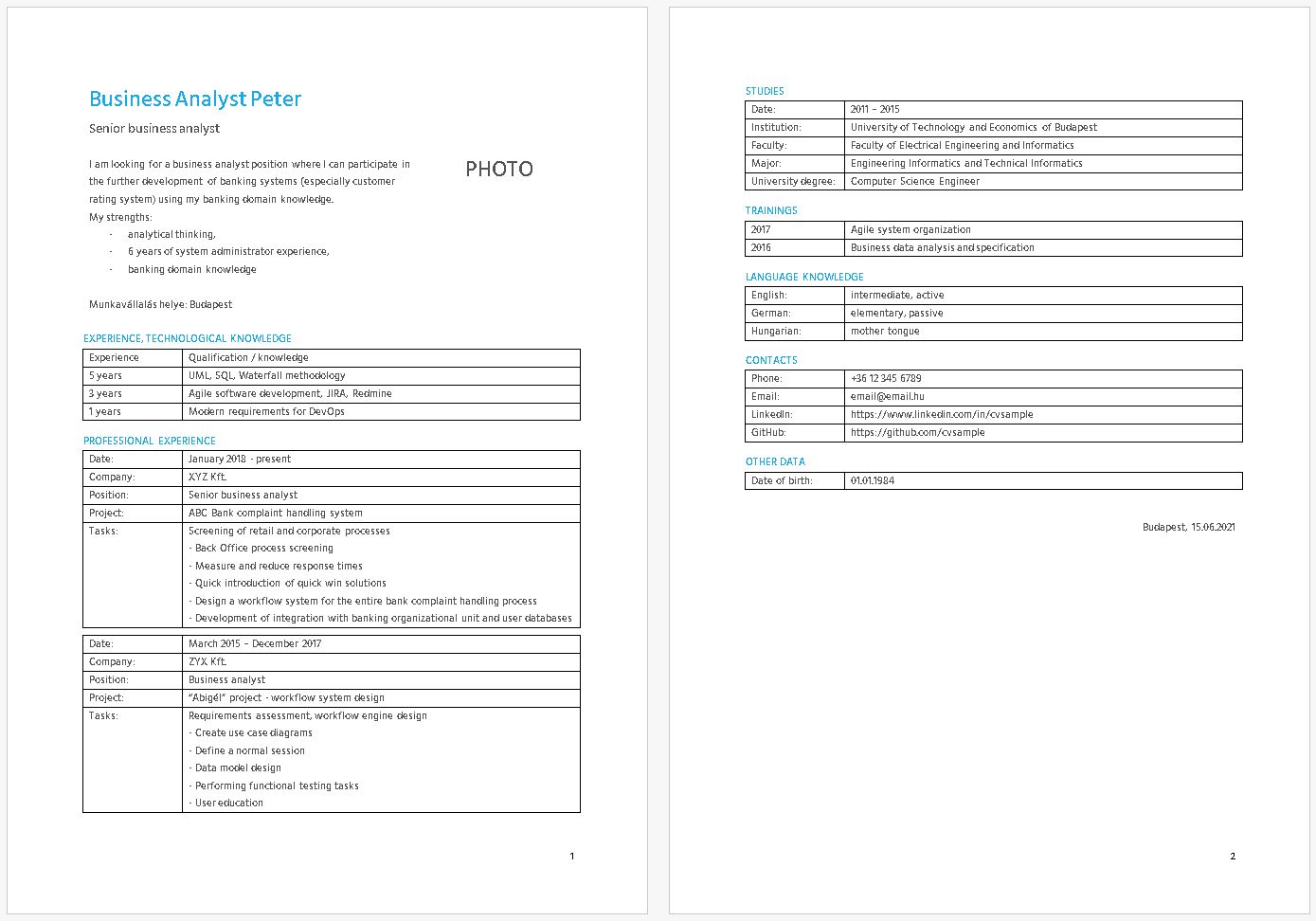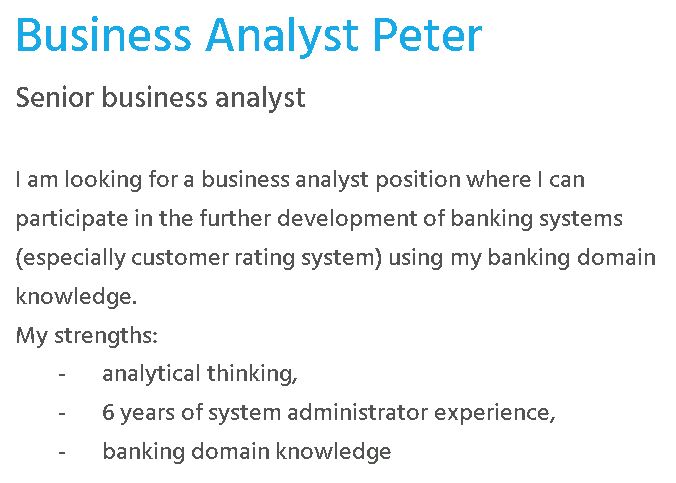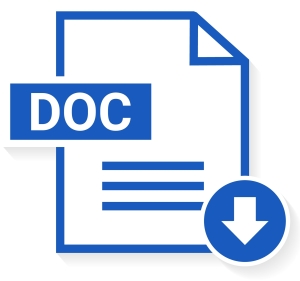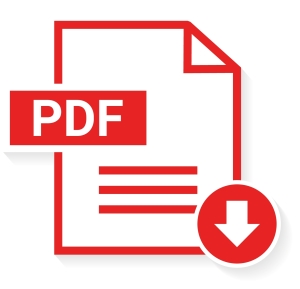What is a good resume like? How do IT recruits find you? CV tips and downloadable resume samples for IT professionals.
More...
How can you make a resume that can be easily used by IT recruiters? Look at your resume through the eyes of an IT recruiter or an IT researcher! Why? Because you will be contacted with job offers by IT recruiters from a company, or by companies specialized in IT staffing such as Bluebird.
Here at Bluebird, we check out the resumes of thousands of IT experts. When I asked my IT recruiter colleagues what they considered as a good resume, I started receiving notifications from Slack every minute. Messages started flowing in. They all began listing the criteria, and the most important content collectively.
Let’s see what the observations and thoughts of the experts in charge are on selecting project managers, business analysts, developers, testers and operators based on a resume sample! After going through tens of thousands of resumes we know what you need to pay attention to!
Here come the resume tips!
1. Your Resume Should Be Thematic!
Your resume must not be a novel! It is important to keep that information visible at first glance, based on which the IT recruiter makes a decision. If you write lengthy sentences, it will be hard to find what is essential. Many people won’t even look for long, so you might miss out on job opportunities because of that. Be concise, make a short resume!
The optimal length of a resume is 2-3 pages.
Don’t make resumes like this!

This is what a resume looks like (photo included of course)! Resume samples at the end of the article!

2. Write Your Field of Expertise Under Your Name!
If you mention your field of expertise under your name, you win. Every recruiter will instantly see if they are looking for you or not.
You could of course say that they should read the resume thoroughly and then they will know. However, the question is: Isn’t that better for the company or agency IT recruiter if it’s obvious what you do?
I suggest you write it right below your name! Like this for instance: « Senior business analyst » or « Junior angular developer ». By doing this, you can make sure that you will be contacted with job offers in accordance with your level of experience and field of expertise, and not with something completely irrelevant for you.
On a side note, mentioning your field of expertise is not enough in itself for us to be able to determine if we are looking for you or not for a given position. To do so, we must know if you are skilled in a given technology, if you have the domain knowledge if you know the toolsets to be used, how much experience you have in a given programming language, etc. You can read our tips on this below.
3. You Must Be Recognizable in Your Photo!
Many resumes include a photo which in itself is a good thing, but only if the photo:
This will not be good:

4. Add Your Phone Number and Email Address
You definitely should include your phone number and e-mail address on your resume! It will enable us to contact you quickly. Without these, in fact, you don’t even have a resume.
If you are on LinkedIn, include the LinkedIn URL as well. Given, that as part of the recruitment process we use LinkedIn as well, you will make it easier for us to reach you!
Other contact information might be interesting too, your GitHub page for instance!
Don’t include your Facebook page. Show instead during an interview what you can do. Don’t risk an opportunity for an interview because of the recruiter’s prejudice based on a Facebook photo or post.
5. Make It Clear What Kind of Work You Are Looking for!
Many resumes include a long motivational part. It is not necessary, especially if the resume is already long. Make it clear what exactly you are looking for, in what field you would like to work.
Simply like this:
“Currently I work as a Java developer. I am looking for a job where I can try myself as a leading JAVA developer, as the professional leader of a small group.”
Or for example:
“I am looking for a position as a system analyst, where I could use my knowledge of banking domain in improving banking systems (CRM systems in particular)”
The more precisely you know what you are looking for, the better your chances are that the job will find you!

6. Show How Skilled You are!
Include all the programming languages, frameworks, database operators, tools, etc. you have used, but only those you are truly skilled in!
Classify these by skill level! Start with what you know best! If you mention next to them how many years of experience you have in each, even better!
Present your domain skills in the same way! If, for instance, you have worked in the banking area, elaborate how knowledgeable you are and in which areas. (ex.: online banking, card systems, risk, etc.)
Don’t use diagrams to present your skills on any account. It is unnecessary!

7. Structure Your Previous Projects and Workplaces!
Use a simple and clear structure to present your previous workplaces/projects!
Date:
Company:
Job description:
Project:
Tasks:
December 2017 – October 2018
XYZ Ltd.
System analyst
ABC Bank complaint management system.
Assessing requirements, logical system planning, functional testing, end user training.
Or:
Date:
Company:
Job description:
Project:
Technologies:
March 2019 – December 2020
ZYX Ltd.
Java developer
Work-flow engine development
Java 1.8, Struts, Hibernate
8. Write About What YOU Did!
When describing tasks, describe the tasks YOU completed! It is not important what tasks, in general, had to be accomplished during the project, only those YOU accomplished.
Same thing for technologies. You won’t be a full stack developer just because during the project the frontend and the backend were completed. If you were working on the frontend, then put only that in your CV!
9. Include Your Degrees in Your Resume!
Google doesn’t require you anymore to have a degree, but most recruiters still do. Write it in your resume just to make it obvious. If there are no qualifications in your resume you might miss out on being a potential candidate.
It would be best to give the name of the university, the field of study, your speciality, and the level of your degree as well. If you have several degrees, list them all.

10. It’s Your Real Language Skills That Count!
In most resumes appear a list of language exams the individual has passed. Instead of this only write down on what level you are able to communicate and in which languages. That is what the IT recruiter and the future employer are interested in anyway, for positions where language skills are important.
11. Make It a PDF!
In terms of format, a PDF can be well used today. Make your CV (in Word for ex.) and save it as a PDF.
We will give you a sample, feel free to use it (see at the bottom of the article)
12. Add the Date to Your Resume!
If you add a date, the resume’s relevance will be obvious for everybody. Don’t use automatic dating, write it yourself!
13. Marital Status and Hobbies?
Yes, these are interesting and personal information but believe us, it won’t help with the preliminary selections if you are married or if you like to ride your bike. Best case scenario: this information will come up during the interview with your future boss.
What DO NOT write in your resume
We have had lots of advice about what your resume should look like. Here are a few common resume mistakes to avoid.
Salary requirements
You may be unsure of the salary range you can negotiate with a particular employer. Nor is it certain that you will earn the same amount of money in every job. Indeed! With increased knowledge and experience, your salary requirements will vary according to the job and employer.
I strongly advise not to include your salary requirements on your resume. You may not be interviewed just because you put a too high or too low salary on your resume. If it's too low, the employer may believe you're "too junior". If you have an unrealistic salary expectation, they may respond, "this salary does not fit, I am not even going to listen."
However, it is a different situation if you discuss this with the prospective employer at the end of the interview. By then, they may have already established trust and sympathy for you. In this case, many companies will also be more flexible on salary. Additionally, the interviewer may have the salary range available at the time of the interview. There is no way to predict the future.
Spelling mistakes
Make sure your resume does not contain any spelling mistakes. It can be extremely frustrating for an interviewer to read a resume that contains numerous spelling errors. "If your resume is already full of mistakes, what will a fast-paced business letter look like?" A legitimate suggestion.
Utilize Word to eliminate errors and thoroughly read your resume, even several times!
High school
If you hold a higher education degree, you should omit your high school's name. A possible exception would be if you attended a severe and strong high school, and it would be beneficial to mention your name.
If you do not have a tertiary education, entering high school is a must!
Date of birth
If you feel that you may be rejected based on your age before the interview, do not include it. "Based on your age" could refer to you being either too young or too old. In general, the latter can be a problem, as junior candidates' resumes will typically indicate little or no work experience.
Not relevant work experience
Do not include any work experience on your resume that is unrelated to or opposed to your current position. However, be careful! If your resume contains gaps (missing time zones), you can count on the question "what did you do at this time" or "why was this period left out." Although, on the other hand, if you worked as a gardener for half a year during or after college, but you are applying for a senior software development position, gardening as an activity adds no value.
Recap of the Resume Tips
In a nutshell, our advice would be for your resume to be short, well-structured, containing exclusively the technologies and skills you have. Avoid lengthy paragraphs and include your current position, and with which technologies you would like to work with, and what positions you are looking for. Make it obvious and clear. And we promise to propose you the IT jobs you are looking for!
Downloading Resume Samples
We prepared some resume samples. Our aim was to help you make your resume quickly and simply! When you are done, upload it here or check out our current IT job offers.
Free download Resume sample 2022 - IT
How to write a good cover letter to accompany your resume?
While writing a cover letter is not very popular among IT professionals, it is a significant advantage when applying for a position, as a well-written cover letter increases your chances of getting the desired job. Are you wondering how to elicit sympathy from your interviewer with your cover letter?
Read How to Write a Professional Cover Letter? and create a memorable cover letter in minutes.
Summary
When creating a resume, pay attention to the following!
Keep your resume short, structured, and include only the technologies and skills you know. Avoid wordy wording and write down what kind of job you currently work in, with what technologies, and what kind of job you would like to work in. Be crystal clear! Attempt to avoid misspellings!
Finally, and perhaps most importantly, in order to make a favorable impression, we strongly advise you to tailor your resume to the company or position for which you are applying.
And we promise to offer you the IT jobs you are looking for!





